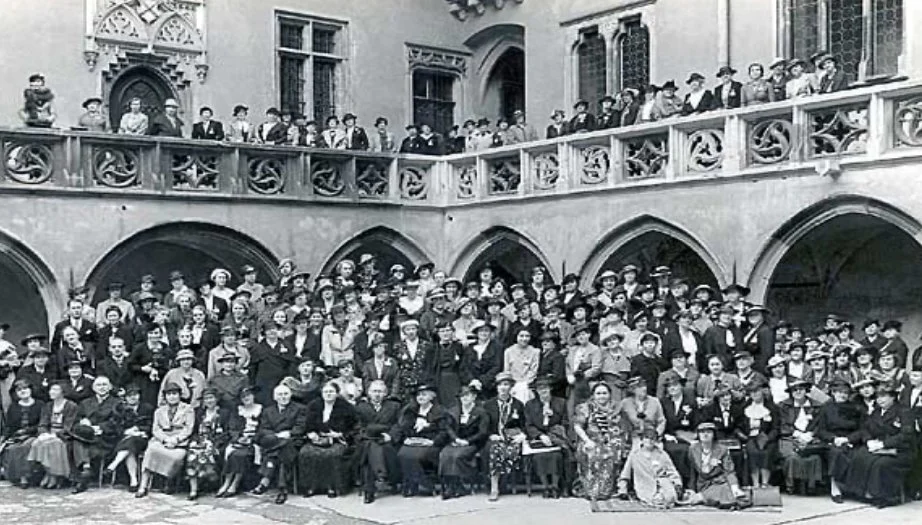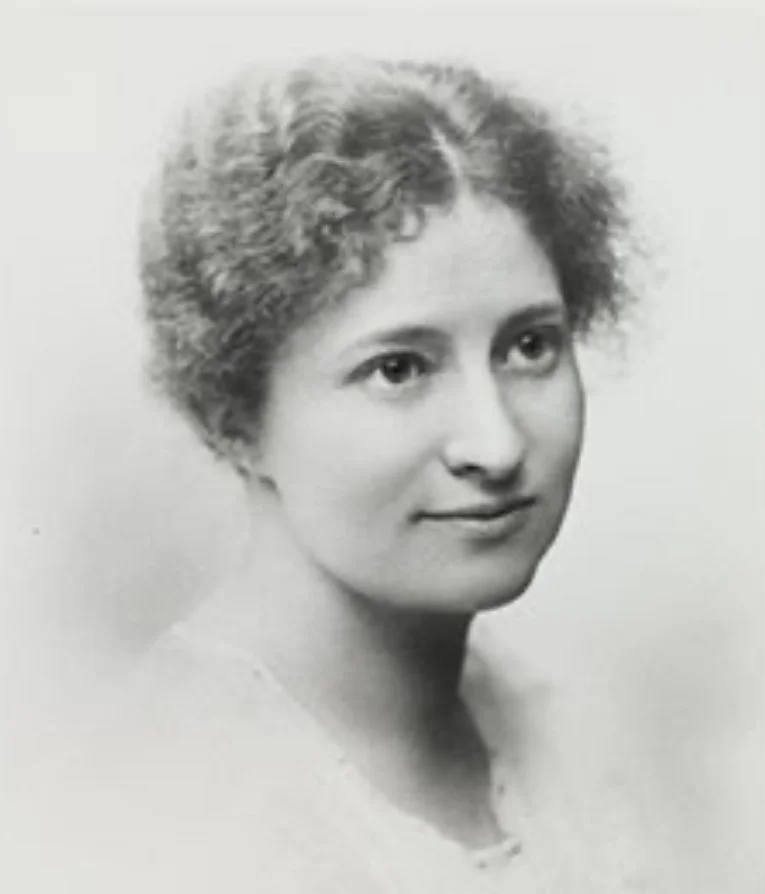OUR Graduate Women ‘Herstory’
‘from small beginnings….’
Image courtesy of Graduate Women International (Early GWI members)
GWI Archives relocating to Atria in Utrecht
GWI archives are being relocated to Atria the ‘knowledge institute for emancipation and women's history’ in Utrecht and will be accessible in mid-2026. The Atria institute will move into the former courthouse on Hamburgerstraat, a centrally located and easily accessible location. This move will help strengthen Atria's role as the leading national knowledge institute for emancipation and women's history.
Click this link to find out more about Atria and book your Atria visit https://atria.nl/
Atria's roots lie in Amsterdam, where the International Archives for the Women's Movement (IAV) was founded in 1935. In 2013, Aletta (formerly IAV) merged with E-Quality, an organization with origins in The Hague, to form what is now Atria. Since then, Atria has combined scholarly expertise with its internationally renowned collection in the field of women's and gender history.
Jubilee 90th Year - Starting in December 2025 and continuing through 2026, Atria's 90th anniversary will be celebrated with a stimulating program that looks back at its rich history and forward to its future.
“Our founders were pioneers,” says Sue Cathro, former Graduate Women Otago President and long standing committee member. “Establishing an organisation dedicated to female university graduates to use their education to reach out worldwide to build relationships and understanding, take part in local, national and international affairs and work towards creating a peaceful world, was really remarkable.”
Women have been awarded degrees since Caroline Freeman received her BA in 1885, with the UK Oxford University only granting degrees to women in 1920. When Dean Virginia Gildersleeve, Professor Caroline Spurgeon and Rose Sidgwick sat together in 1918 and conceived the idea of a worldwide organisation uniting university women, they were convinced that by fostering friendship and understanding, women graduates could help prevent another catastrophe such as the World War that had just ended. Their dream became reality the next year when university women from Great Britain, Canada and the United States met to lay the foundation for IFUW. Over ninety years later, and under the new title of Graduate Women International (GWI), thousands of women graduates throughout the world share the same principles and vision that inspired those early leaders. GWI continues to advocate in favour of secondary, higher and continuing education for women all over the world. Click here to follow the GWI Timeline : 1919-2015
The original lamp logo was designed by members of the Norwegian Federation for the Third Conference in Oslo in 1924. The delegates at that meeting adopted it as the permanent badge of IFUW. The original showed an antique lamp representing the light of learning on a blue background broken with the letters of IFUW. Around the central disc was an interlinked chain symbolising the bonds of friendship linking IFUW members throughout the world. Eventually the lamp came to be known as the lamp of friendship. It was later modernised and the chain was dropped.
Image: Helen Rawson, Founder New Zealand Federation of University Women. G. Helen Rawson, n.d. J.Webster photograph, from file copy print, 693.00368, Hocken Collections, Uare Taoka o Hākena, University of Otago.
Image: Sue Cathro former GWO President and long standing Graduate Women Otago Committee Member and Academic Dress Convenor Sue Cathro: “Our founders were pioneers.” Photo Credit: Guy Frederick - Hocken Legacy
‘By Women, for Women’ Graduate women otago
Originally formed as the first branch of the New Zealand Federation of University Women, an offshoot of the International Federation of University Women, Graduate Women Otago's foundations lie half a world away. In the aftermath of World War I, a desire from university women to promote peace and international understanding led to the establishment of the International Federation of University Women (IFUW), with the first conference held in London in 1920. A year earlier, Helen Rawson, the woman who would later found the New Zealand branch of the federation and become New Zealand's first president, met with IFUW founders Winifred Cullis and Virginia Gildersleeve. The Cambridge University BSc graduate, who received her degree in retrospect due to Cambridge not awarding degrees to women at the time, returned to Dunedin in 1920 with an enthusiasm for the new organisation, recruiting other like-minded women. A letter, dated June 1920, was sent by the temporary committee to university colleges in Christchurch, Wellington and Auckland, encouraging their groups to join the proposed new organisation. At the first New Zealand conference in 1921, Helen Rawson, by then the Dean of Home Science at Otago, was elected president, the Otago branch became the first Dominion Executive and undertook to draw up a constitution for New Zealand.
At the second IFUW conference in Paris in 1922, Kate Hogg, an Otago graduate studying at the Sorbonne, presented the constitution and NZFUW became affiliated. “These women were well travelled, well educated, amazing women of their time,” says Cathro. “There are many links between the original founders and the group I later joined in the 1960s – including a personal link with Kate Hogg who was my French teacher at secondary school. “In those early days, there was already an Otago University Women's Association and, for several years, the two organisations ran side-by-side, sharing committee members until 1924 when they amalgamated.”
From the beginning, the organisation has raised money for fellowships to support graduate women – initially to come to New Zealand to study. Fundraising also enabled the purchase of Crosby Hall, a 16th century house in London used as headquarters for the British federation, which became a place to stay and study for graduates from all over the world.
“Our founders were pioneers”
Sue Cathro, Graduate Women Otago's former president and longstanding committee member was inspired to join GWO in 1969 due to the “wonderful women” and an interest in the hiring of academic dress: she held the position of Academic Dress Convenor for 30 years. Sue says up until 1933 academic regalia was borrowed from staff of schools and the University but, as the numbers of students increased, more gowns and hoods were needed. Home Science's Avice Bowbyes and her helpers made the first six hoods. Gowns and trenchers were gradually acquired and, in the 1950s, the University's stock was bought and the branch has organised all the hiring ever since.
Sue also notes “now Otago University has several graduation ceremonies every year. There are a prolific number of different degrees on offer, including postgraduate, and GWO also hires out regalia for special events, such as Otago Girls' High School 150th celebrations, school prizegivings and to Otago Polytechnic staff for their two graduations each year.It's a big job and its run by a team of convenors, with the help of member volunteers and student helpers.” Sue Cathro retired as convenor at the end of 2019.
Graduate Women Otago offers awards for community-based organisations, as well as travel awards (established as a 1990 project) to allow members to present original work at national and international conferences. Scholarships are named after past members – the Daphne Purves Award established to help women graduates obtain specialist training and to carry out independent research in any country, and the Helen Benson Awards helps non-graduates pursue a course of study.
Sue proudly states that “GWO has supported many different women over the years across a range of disciplines and study areas and enabled them to travel all around the world. Through our community grants, we've also helped a number of local organisations and helped women take up additional training to help communities. One year, we had a woman who needed to get her heavy-driver's licence so that she could drive the local fire engine which was a fantastic goal. Further afield, we've given money to other projects such as the establishment of a kindergarten in Sierra Leone. Our branch has also produced National Federation Presidents and National Council of Women members, including Helen Benson [Rawson] who became President of the National Council of Women in 1939, one of the few women to be the National President of both organisations. As at the time of Sue’s interview in 2020 seven of the current national council Dunedin members, have been presidents of one – or both – local branches.
“We're extremely proud of our contribution over the years.”
Acknowledgements to AMIE RICHARDSON for her article: Longstanding Graduate Women Otago academic dress convenor Sue Cathro: “Our founders were pioneers.”
Photo: Guy Frederick. Hocken Legacy
This article was updated November 2024 by Otila Osborne, President GWO




